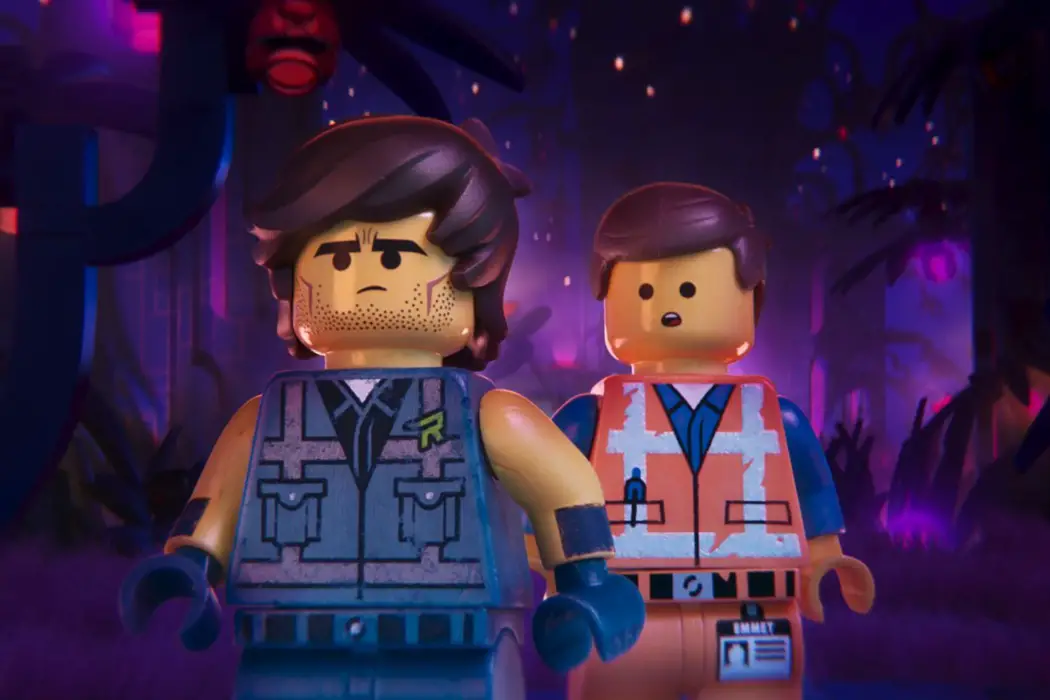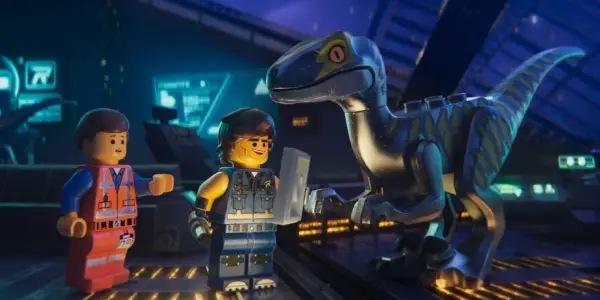The Rampant Rise Of Meta-Humor & THE LEGO MOVIE 2

Rob Caiati is a writer and film critic with a…
There is a scene during The Lego Movie 2: The Second Part in which a new character by the name of Rex Dangervest (voiced by Chris Pratt) enters the scene and singlehandedly saves our lead protagonist, Emmet, through the use of a device that teleports the two away from the perilous “Duplo” toys. In the midst of this last-minute escape, Rex comically refers to this convenient tool as his trusty “plot device.”
This line is just one of many instances in The Lego Movie 2 in which the film points out its own fictional nature, as the character of Rex, an obvious amalgamation of Pratt’s most iconic action roles, serves as a wink to the audience regarding the actor’s shift in trajectory from genial comedies to blockbuster action adventures. The collective layers of the film being aware of its presence in the real world, as well as consciously pointing out its own shortcomings, are a prime example of the growing trend of meta-humor in stories.
What Is Meta-Humor?
While not an exact science, the term “meta-humor” can apply to any attempt at comedy through an acknowledgement from the film that it is a fictional work as well as defining its place in relation to the real world. This type of humor can take the form of characters addressing the viewer directly (“breaking the fourth wall”), making a reference through character dialogue about plot conveniences, or even pointedly referring to the previous installments of the film’s franchise.
Netflix’s recently concluded A Series of Unfortunate Events perfectly illustrates this tactic as characters often will speak directly to the viewer and are never shy about referring to the passage of time as television seasons rather than years.

Although the earliest use of this type of self-awareness occurred as early as 1918 with the silent film Men Who Have Made Love to Me, this technique as a means for humor has arguably never been more popular than it is today. Many attribute the surging popularity of the Deadpool franchise over the last few years to its irreverent willingness to poke fun at its own stature next to bigger superhero franchises. Just looking at this month’s releases, two of the most anticipated titles, The Lego Movie 2 and Isn’t It Romantic, a rom-com in which the lead character is aware that she is a character plagued by the tired tropes of the genre, it appears that meta-humor is connecting with audiences more than ever before.
This resonance begs the question of why this storytelling technique is being so well-received right now.
Authentically Levels With The Audience
The core appeal of meta-humor comes from the film’s willingness to level with the audience. Recent studies have revealed that trust for corporations are at an all-time low, with the youngest age groups being particularly distrustful towards advertising thanks to their increased need for authenticity. It follows that this level of mistrust extends to the release of films, as there has been more and more outcry from audiences regarding the number of sequels, prequels, and reboots being churned out each year.

Meta-humor can effectively bridge this divide as it deftly lends a degree of authenticity to a film. Instances in The Lego Movie, such as Batman remarking on the number of Batman franchise films currently in development as well as poking fun at some of the past cinematic blunders, create a degree of openness between the creator and the audience.
It is more or less a straightforward admission that the studio is aware of how ludicrous creative decisions can appear to the outside world, as well as a concession that they are human and not above making mistakes. What’s more it also addresses the elephant in the room and acknowledges that despite the film being an art form, it is still a business and the creator is not inclined to insult the audience’s intelligence by hiding this simple truth.
Expediently Strengthens A Screenplay
Another reason that meta-humor has become such an effective tool in a screenwriter’s arsenal is the fact that this type of joke can outwardly strengthen the writing of a story. Similar to the earlier mentioned Rex Dangervest “plot device” example, throughout Deadpool 2 there are a number of instances in which events transpire with an ongoing commentary from the titular assassin. These razor-sharp quips from “The Merc with a Mouth” explicitly calling out the conveniences of different plot progressions allow the film to humorously address these issues head on. The end result is a film that has its comedic value bolstered thanks to the ironic inclusion of bad writing.
It’s worth noting that many pundits have questioned whether this strategy is brilliant or merely lazy, as over time it provides writers with an easy way to go wherever they want to with their story. Additionally, it could be argued that films such as Deadpool 2 are almost overly reliant on this approach, as with almost everything, the more this type of joke is used the less impact it has. While the merits of this approach are still up for debate, there’s no denying that audiences hold it in high esteem as both Deadpool 2 and its PG-13 re-release Once Upon a Deadpool had viewers flocking to theaters during 2018.
A Simple Solution For Widespread Appeal
Creators of animated films have long struggled with generating a story that not only appeals to the usual target audience of young children but also has sufficient general appeal so that adults will also be drawn to the film. Disney Animation and Pixar have artfully addressed this conundrum for many years now, most recently with the release of Ralph Breaks the Internet. Despite being an animated film, the story includes powerful emotional themes related to friendship in addition to providing a vibrant “kid friendly” aesthetic, resulting in a film that adults are just as enticed to see as children.

Crafting stories with that level of emotional depth can be difficult, which explains why many animation studios vying for universal appeal have historically resorted to the inclusion of crude innuendos instead. The intention being that these raunchy jokes will be veiled enough to go over the child’s head while still providing entertainment for their parents. Although effective in past animated hits such as Dreamwork’s Shrek, there is something undeniably sleazy about this approach, as it comes off as less clever and more like low hanging fruit.
Enter meta-jokes, which afford the creators of animated films with that same desirable mainstream accessibility without having to toe the line so strongly between mature content and wholesome family fun. Quick nods to the film’s fictitious nature manage to be too abstract of a concept for children yet still engage adults and help explain why the first Lego Movie was such a success. The combination of self-awareness being interwoven with complexly grim themes of the mindlessness that comes from consumerism is precisely what established an audience of varying age groups for the animated franchise. As a result, it came as no surprise to see an eclectic mix of age groups in attendance during my showing of The Lego Movie 2.
Conclusion: The Future Of Meta-Humor
Overall, there are a number of unique benefits a film can reap through the inclusion of meta-humor which helps to explain the current ubiquity of the approach. While popular franchise films utilizing meta-humor still perform extremely well, the longevity of this approach remains unclear as both the Deadpool and Lego franchises are trending slightly downward at the box office. Regardless of the future, the widespread use of meta-humor at the very least represents a snapshot in time in which viewers are eager to embrace seemingly honest films that are wholly transparent with their agenda.
Do you agree or disagree about the reasons why meta-humor is currently so popular? Do you think there are other reasons why audiences are connecting with this type of humor? Tell use your thoughts in the comments below!
Does content like this matter to you?
Become a Member and support film journalism. Unlock access to all of Film Inquiry`s great articles. Join a community of like-minded readers who are passionate about cinema - get access to our private members Network, give back to independent filmmakers, and more.
Rob Caiati is a writer and film critic with a passion for movies and TV of all genres. With an MA in Social and Consumer Psychology he is always fascinated by which stories are strongly resonating with society and why. You can find his other reviews and articles at Cinematic Insights (https://cinematicinsights.com).













